VINTAGE EDITION, NOVEMBER 1992
Afterword, 1992 by Kwame Ture copyright 1992 by Kwame Ture
Afterword, 1992 by Charles V. Hamilton copyright 1992 by Charles
V. Hamilton
Copyright 1967 by Stokely Carmichael and Charles Hamilton
All rights reserved under International and Pan-American Copyright Conventions. Published in the United States of America by Vintage Books, a division of Random House, Inc., New York, and distributed in Canada by Random House of Canada Limited, Toronto. Originally published, in somewhat different form, by Random House, Inc., in 1967.
Library of Congress Cataloging-in-Publication Data
Carmichael, Stokely.
Black power : the politics of liberation in America / Stokely
Carmichael & Charles V. Hamilton.
p. cm.
Originally published: New York : Random House, 1967.
eISBN: 978-0-307-79527-4
1. Black power. 2. Afro-AmericansPolitics and government.
I. Hamilton, Charles V. II. Title.
[E185.615.C32 1992]
323.1196073dc20 92-60284
The authors wish to thank the following for permission to quote material which appears in this volume:
The New Republic, for permission to quote from A Time to be Black, by Bruce Detweiler, 1966, Harrison-Blaine of New Jersey, Inc.; and from Accommodating Whites: A New Look at Mississippi, by Christopher Jencks, 1966, Harrison-Blaine of New Jersey, Inc.; The Tuskegee News, for permission to quote from a letter to the editor, January 20, 1966; The National Review, for permission to quote from Organized Labor and the Negro Worker, by Myrna Bain, 1963; Hill and Wang, Inc., for permission to quote from From Plantation to Ghetto by August Meier and Elliot Rudwick, 1966; The Nation, for permission to quote from Murder in Tuskegee: Day of Wrath in the Model Town, by Arnold Kaufman, 1966; Saturday Evening Post, for permission to quote from A New White Backlash, 1966; Professor Kenneth Clark, Ebony magazine, and Harper and Row, Inc., for permission to quote from What Motivates American Whites, from Ebony magazine, 1965, Johnson Publishing Co., Inc., and from Dark Ghetto, 1965, Harper & Row, Inc.; Random House, Inc., for permission to quote from Crisis in Black and White, by Charles Silberman, 1964, Random House, Inc.; Prentice-Hall, Inc., for permission to quote from Racial Crisis in America: Leadership in Conflict by Lewis Killian and Charles Grigg, 1964; from The Negro Leadership Class by Daniel Thompson, 1963; and from The American Negro Reference Book edited by John P. Davis, 1966.
v3.1
This book is dedicated to our mothers, Mrs. Mabel Carmichael (affectionately known as May Charles) and Mrs. Viola White, and to all the black mothers who have struggled through the centuries so that this generation could fight for black power
Our thanks to Ivanhoe Donaldson, who made a major contribution in , to SNCC and to all the people in the struggle with whom we worked, for their help, insights and strength in the formation and articulation of the ideas presented in this book.
FROM THE AUTHORS, 1992
 Our paths have taken different routes in the twenty-five years since the publication of this book in 1967. But our commitment to the political struggle of our people in Africa and around the world has remained consistent.
Our paths have taken different routes in the twenty-five years since the publication of this book in 1967. But our commitment to the political struggle of our people in Africa and around the world has remained consistent.
Indeed, one of us (Kwame Ture) began organizing the All African Peoples Revolutionary Party in 1967 and became an officially recognized member of its central committee when it was publicly announced in 1972. Kwame Ture has lived in the Peoples Revolutionary Republic of Guinea since 1968. His ideas and understanding of the fight for Pan Africanism under an all-African Socialist Government have been sharpened by his work and study with Kwame Nkrumah, co-president of the Peoples Revolutionary Republic of Guinea, and Guinean President Sekou Toure prior to their deaths.
Charles V. Hamilton, since 1969, has been a professor of political science at Columbia University. He has written several books on American politics, race, and public policy during this time.
Many readers have asked us over the years how our views have changed, if at all. We certainly hope so, and the Afterwords should reflect this from our individual perspectives and experiences. From these accounts, the readers can make their assessments. We attempt to be brutally honest about our respective positions, self-critical, and always mindful that our analyses and emphases will and should be subject to evaluation and criticism. We do not reject this scrutiny. We believe that a correct understanding of the nature of our struggle is essential. And we hope that our individual subsequent thoughts will aid this process. We both are far more keenly sensitive to the international implications of our struggle than our initial presentation indicated. We both believe that until Africa is free, no African anywhere in the world will be free. To us, this is self-evident. It is also self-evident that the revolutionary struggle for that goal will not be deterred.
Kwame Ture
Charles V. Hamilton
JULY 1992
This book presents a political framework and ideology which represents the last reasonable opportunity for this society to work out its racial problems short of prolonged destructive guerrilla warfare. That such violent warfare may be unavoidable is not herein denied. But if there is the slightest chance to avoid it, the politics of Black Power as described in this book is seen as the only viable hope.
S TOKELY C ARMICHAEL ,
C HARLES V. H AMILTON
AUGUST 1967
CONTENTS
PREFACE
 This book is about why, where and in what manner black people in America must get themselves together. It is about black people taking care of businessthe business of and for black people. The stakes are really very simple: if we fail to do this, we face continued subjection to a white society that has no intention of giving up willingly or easily its position of priority and authority. If we succeed, we will exercise control over our lives, politically, economically and psychically. We will also contribute to the development of a viable larger society; in terms of ultimate social benefit, there is nothing unilateral about the movement to free black people.
This book is about why, where and in what manner black people in America must get themselves together. It is about black people taking care of businessthe business of and for black people. The stakes are really very simple: if we fail to do this, we face continued subjection to a white society that has no intention of giving up willingly or easily its position of priority and authority. If we succeed, we will exercise control over our lives, politically, economically and psychically. We will also contribute to the development of a viable larger society; in terms of ultimate social benefit, there is nothing unilateral about the movement to free black people.
We present no pat formulas in this book for ending racism. We do not offer a blueprint; we cannot set any timetables for freedom. This is not a handbook for the working organizer; it will not tell him exactly how to proceed in day-to-day decision-making. If we tried to do any of those things, our book would be useless and literally dead within a year or two. For the rules are being changed constantly. Black communities are using different means, including armed rebellion, to achieve their ends. Out of these various experiments come programs. This is our experience: programs do not come out of the minds of any one person or two people such as ourselves, but out of day-to-day work, out of interaction between organizers and the communities in which they work.
Therefore our aim is to offer a framework. We are calling here for broad experimentation in accordance with the concept of Black Power, and we will suggest certain guidelines, certain specific examples of such experiments. We start with the assumption that in order to get the right answers, one must pose the right questions. In order to find effective solutions, one must formulate the problem correctly. One must start from premises rooted in truth and reality rather than myth.


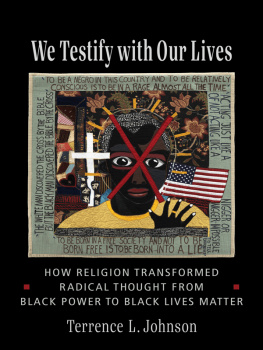
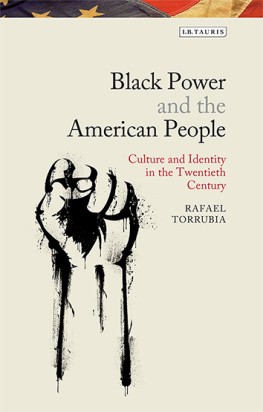
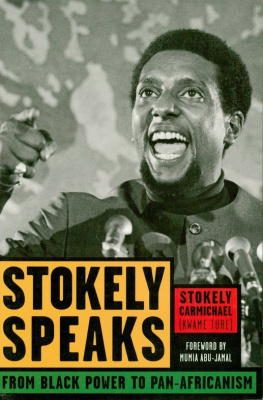
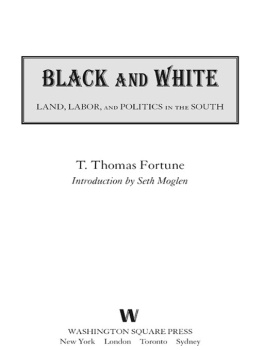
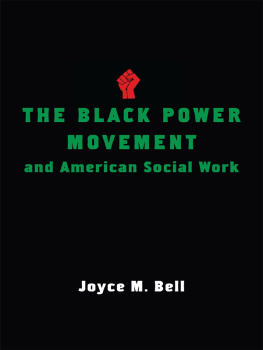
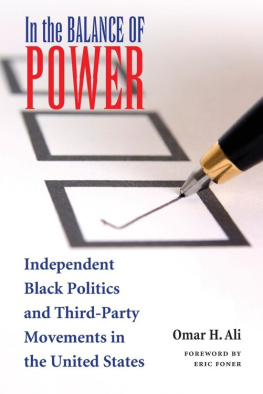
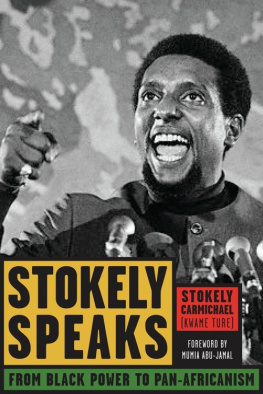
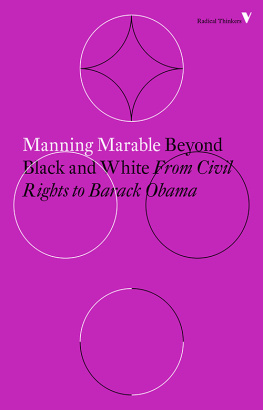
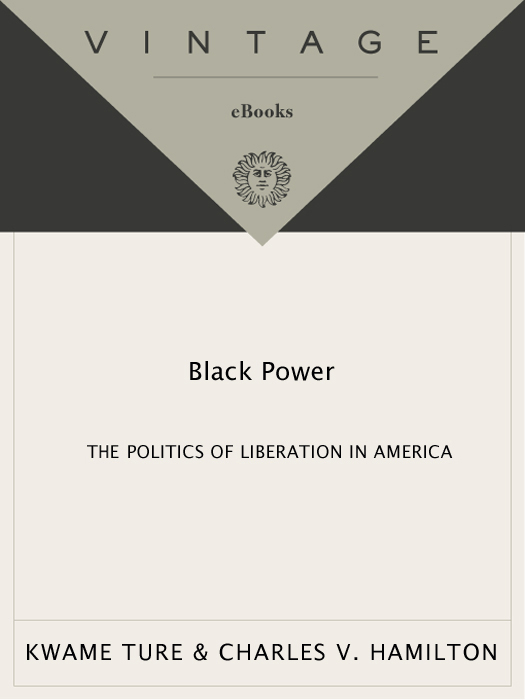
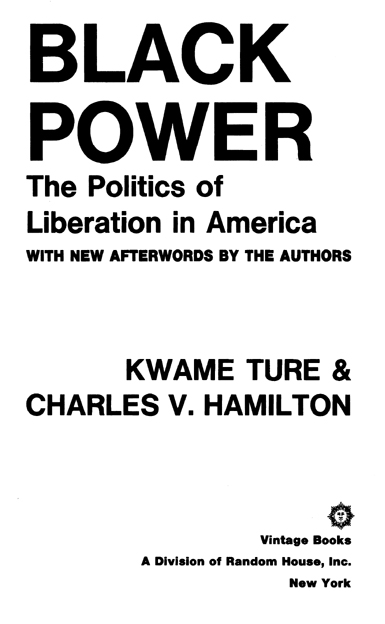
 Our paths have taken different routes in the twenty-five years since the publication of this book in 1967. But our commitment to the political struggle of our people in Africa and around the world has remained consistent.
Our paths have taken different routes in the twenty-five years since the publication of this book in 1967. But our commitment to the political struggle of our people in Africa and around the world has remained consistent.